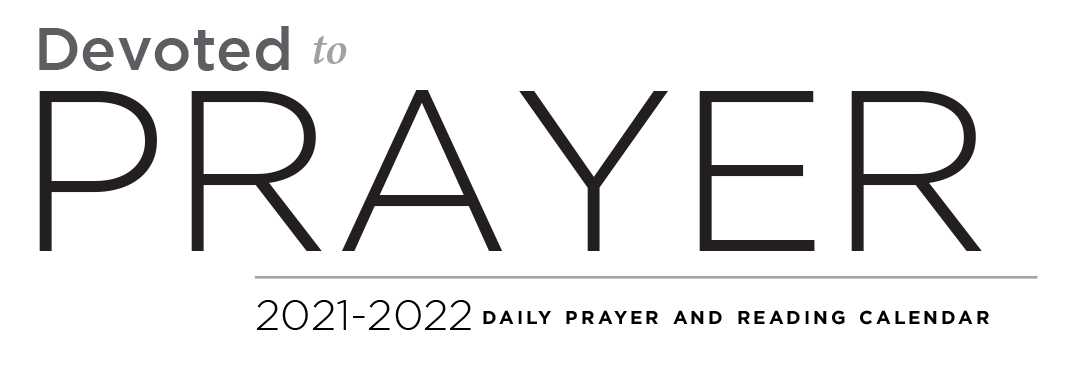
Saturday of the Second Week in Advent
In this passage, the apostle Paul warns about the dangers of “walking in idleness.” It is a curious turn of phrase. Walking requires movement; idleness indicates stillness. So, what might it mean to “walk in idleness”?In his classic book, Man’s Search for Meaning, Victor Frankl, a Jewish psychiatrist and Holocaust survivor describes in vivid detail his life in a Nazi concentration camp. What is interesting about his account is that he writes from the perspective of a psychiatrist. During his time of internment, he noted that how well a prisoner endured the horrors of the camps was tied to their sense of meaning and purpose in life. Those who could envision a productive future and their place in it had a reason to live and a purpose in life.
Even amidst the horrors of Auschwitz, Frankl found the strength to endure. As a psychiatrist and scientist, he wanted to live long enough to finish a manuscript outlining his therapeutic theories. As a physician, he found purpose in caring for the sick and injured prisoners in the camp. As a husband, son and brother he was strengthened by the hope of being reuniting someday with his beloved wife and family. Frankl sadly noted, however, that the prisoners in the camp lacking meaning or purpose in life did not usually survive. Seeing no hope for tomorrow, they saw no point in today — and eventually lost the desire to live.
As I read today’s text, I was reminded of Frankl’s word and wondered if Paul’s use of the phrase “walking in idleness” was not so much a condemnation of laziness as it was a warning against the dangers of a life lived without meaning and purpose. In verse 15 Paul writes that we should not regard the person walking in idleness as an enemy, but rather as someone to be warned.
Victor Frankl eventually wrote his manuscript and founded a school of psychotherapy that he termed “logotherapy” from the Greek word “logos” which can be translated as “meaning” in English. The core of logotherapy is the encouraging of others to find the hidden logos/meaning in their lives.
As Christians, we believe that the logos is no longer hidden. The more common translation of Greek word “logos” is “word”. The gospel of John verses 1 and 14 proclaims, “In the beginning was the Word/logos, and the logos was with God, and the logos was God… and the logos became flesh and dwelt among us, and we have seen his glory, glory as of the only Son from the Father, full of grace and truth” (John 1:1, 14).
In Christ we have meaning, purpose and direction for our lives. In the great commandment He gives us purpose with the instructions to “love the Lord your God with all your heart and with all your soul and with all your mind…and your neighbor as yourself.” In the Great Commission, He gives us direction by sending us into the world to make disciples, baptize and teach. We do all this secure in the knowledge that Christ, the logos made flesh, walks with us, giving us strength for today and hope for tomorrow. Advent is a season of anticipation. It is not, however, a time of idle waiting but rather a time of joyful preparation for the coming of the one who gives meaning and purpose to our lives. Jesus Christ, the logos made flesh.
Prayer: Dear Lord Jesus, You are the Word that gives meaning to our lives. Help me to face each day with conviction rather than idleness. I pray this day that You would open my eyes to see clearly the path You have laid before me. Direct my feet to someone I might serve in Your name. Use my hands to lift someone up and my voice to give encouragement by proclaiming Your saving grace. Give me the courage to face today strengthened by the knowledge that You are by my side. In Christ’s name I pray. Amen.
Devotion written by The Rev. David F. Keener
Morning Psalms
Evening Psalms

This daily prayer and Bible reading guide, Devoted to Prayer (based on Acts 2:42), was conceived and prepared by the Rev. Andrew S. Ames Fuller, director of communications for the North American Lutheran Church (NALC). After several challenging years in the midst of the COVID-19 pandemic, we have been provided with a unique opportunity to revitalize the ancient practice of daily prayer and Scripture reading in our homes. While the Reading the Word of God three-year lectionary provided a much-needed and refreshing calendar for our congregations to engage in Scripture reading, this calendar includes a missing component of daily devotion: prayer. This guide is to provide the average layperson and pastor with the simple tools for sorting through the busyness of their lives and reclaiming an act of daily discipleship with their Lord. The daily readings follow the Lutheran Book of Worship two-year daily lectionary, which reflect the church calendar closely. The commemorations are adapted from Philip H. Pfatteicher’s New Book of Festivals and Commemorations, a proposed common calendar of the saints that builds from the Lutheran Book of Worship, but includes saints from many of those churches in ecumenical conversation with the NALC. The introductory portion is adapted from Christ Church (Plano)’s Pray Daily. Our hope is that this calendar and guide will provide new life for congregations learning and re-learning to pray in the midst of a difficult and changing world.
